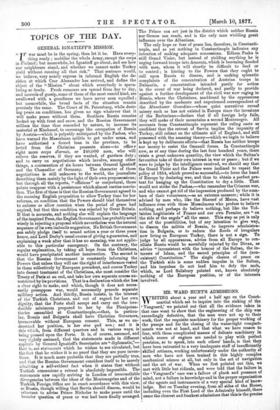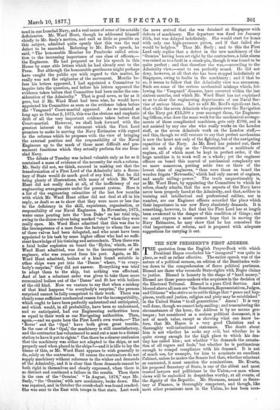MR. WARD HUNT'S ADMISSIONS.
WRITING about a year and a half ago on the Court- martial which sat to inquire into the sinking of the 'Vanguard,' we pointed out that all the evidence taken in that case went to show that the engineering of the ship was exceedingly defective, that the men were not up to their work, that the requisite machinery for the proper working of the pumps and for the closing of the water-tight compart- ments was not at hand, and that what we have reason to fear, with these complicated masses of delicate machinery in which scores of engines are needed to play with perfect precision, so to speak, into each others' hands, is that they have been entrusted to a very inadequate staff of insufficiently skilled artisans, working unfortunately under the authority of men who have not been trained in this highly complex mechanical science at all, but only in the art of navigation and the art of war. When we first pointed out this, we met with little but ridicule, and were told that the failure in the 'Vanguard's' case was a failure of pluck and presence of mind, not a failure in knowledge and in the proper organisation of the agents and instruments of a very special kind of know- ledge. But on Tuesday evening, from all sides of the House, including even the First Lord of the Admiralty himself, there came the clearest and frankest admissions that this is the precise
need in our Ironclad Navy, and a real cause of some of its notable deficiencies. Mr. Ward Hunt, though he addressed himself chiefly to Mr. Seely's motion, and said as little as possible on this subject, admitted quite openly that this was the real defect to be amended. Referring to Mr. Reed's speech, he said, "The honourable Member for Pembroke called atten- tion to the increasing importance of one class of officers,— the Engineers. He had prepared us for his speech in this House by some able letters which he had already sent to the Press. But although the honourable gentleman might perhaps have caught the public eye with regard to this matter, he really was not the originator of the movement. Months be- fore his letters appeared, I had appointed a Committee to inquire into the question, and before his letters appeared the evidence taken before that Committee had been under the con- sideration of the Admiralty." That is good news, so far as it goes, but if Mr. Ward Hunt had been wise, he would have appointed his Committee as soon as the evidence taken before the 'Vanguard' Court-martial appeared. As we insisted as long ago as October 2, 1875, this was the obvious and emphatic drift of all the very important evidence taken before that Court-martial. However, we shall look forward with the greatest interest to the statement which the First Lord promises to make in moving the Navy Estimates with regard to the reforms which he proposes with the view of bringing the external position and the responsibility of the Naval Engineers up to the mark of those most difficult and pre- eminent functions which they actually perform for our Iron- clad Navy.
The debate of Tuesday was indeed valuable only as far as it contained a mass of evidence of the necessity for such a reform. Mr. Seely did not, we think, succeed in making out that the transformation of a First Lord of the Admiralty into a Secre- tary of State would do much good of any kind. But he did bring plenty of illustrations, with many of which Mr. Ward Hunt did not really deal at all, of the inefficiency of our engineering arrangements under the present system. Here is a list of the engineering calamities of the last few months with which Mr. Ward Hunt either did not deal at all in his reply, or dealt so as to show that they were more or less due to the deficiency in the skill, experience, organisation, or responsibility of our Naval Engineers. In November, 1875, water came pouring into the 'Iron Duke' on her trial trip, owing to the sluice-valves being marked "shut" when they were really open. Mr. Ward Hunt admitted that this was due to the incompetence of a man from the factory to whom the care of these valves had been delegated, and who must have been appointed to his task by some higher officer who had no suffi- cient knowledge of his training and antecedents. Then there was a fatal boiler explosion on board the 'Hydra,' which, as Mr. Ward Hunt admitted, was due to the incompetence of an engineer, who was removed from his post. Again, as Mr. Ward Hunt admitted, boilers of a kind found suitable in other ships were put into the ' Danae ' where, "to every- body's surprise," they did not answer. Everything was tried to adapt them to the ship, but nothing was effectual. And at last a reluctant order was given to take these more economical boilers out of the Danae ' and fit her with boilers of the old kind. Now we venture to say that when a mishap of that kind happens "to everybody's surprise," the persons surprised cannot be gully competent to their work. There was clearly some sufficient mechanical reason for the incompatibility, which ought to have been perfectly understood and anticipated, and which would, in all probability, have been so understood, and so anticipated, had our Engineering authorities been as equal to their work as our Navigating authorities. Then, again,—and we quote here the First Lord's own words,—" The 'Rover' and the ' Opal ' have both given great trouble.. In the case of the 'Opal,' the machinery is still unsatisfactory, and the contractor has volunteered to send out a man to a distant station to have it put to rights." Can there be a clearer confession that tie machinery was either not adapted to the ships, or not properly used when placed in the ships I—and it is idle to lay the blame of this, as Mr. Ward Hunt appears to wish generally to do, solely on the contractors. Of course the contractors do not supply machinery without reference to the wishes and demands of the Admiralty, and it is clear that those demands cannot be both right in themselves and clearly expressed, when there is so distinct and continued a failure in the results. Then there is the case of the Orontes.' "In August, 1876," says Mr. Seely, "the ' Orontes,' with new machinery, broke down. She was repaired, and in October the crank-shaft was found cracked. She was sent to the East with troops in that state. Last week the news arrived that she was detained at Singapore with defects of machinery. Her departure was fixed for January 25th, but was delayed indefinitely. She would start for home with only one high-pressure piston, and if that failed she would be helpless." Thus Mr. Seely ; and to this the First Lord only replies that a defect in the new machinery of the 'Orontes' having been set right by the contractors, a false alarm was raised as to a fault in a crank-pin, though it was found to be quite perfect ; and that therefore she was,—according to the Admiralty view,—sent to sea perfectly sound. He did not deny, however, at all that she has been stopped indefinitely at Singapore, owing to faults in the machinery ; and if that be so, it seems to follow that the Admiralty view was erroneous. Such are some of the serious mechanical mishaps which, fol- lowing the ' Vanguard ' disaster, have occurred within the last sixteen months, and which Mr. Ward Hunt has not explained so as to clear the engineering departments of our Naval Ser- vice of serious blame. Let us add Mr. Reed's significant fact, that while the seven Admirals who preside over the Navigation of the Navy get £13,300 a year amongst them, the Engineer- ing Officer, who does the same work for the mechanical arrange- ments of these complicated machines, gets only £900, and is not assisted by any one else who really works on the London staff, as the seven Admirals work on the London staff,— and this, though we will venture to say that perfect mechanism is now the heart not only of the fighting, but of the navigating capacities of the Navy. As Mr. Reed has pointed out, there are in such a ship as the ' Devastation ' a multitude of engines, all of which must be kept in perfect order, if the huge machine is to work well as a whole ; yet the engineer officers on board this marvel of mechanical complexity are no more numerous, putting aside two or three of the lowest class of engineers, "than were those on board the wooden frigate 'Newcastle,' which had only one set of engines, and ample sailing - power." The truth unquestionably is, as Mr. Ward Hunt, by appointing the Committee to which he refers, clearly admits, that the new aspects of the Navy have never been properly faced at the Admiralty, and that, neither in training and intellectual and professional calibre, nor in number, are our Engineer officers accorded the place which their importance in our new Navy absolutely demands. It is something, however, to find that the First Lord has at length been awakened to the danger of this condition of things ; and we must express a most earnest hope that in moving the Navy Estimates, he may show that he has conceived the vital importance of reform, and is prepared with adequate suggestions for carrying it out.



































 Previous page
Previous page